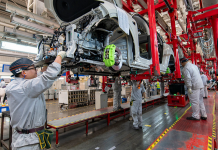Staff Report
ISLAMABAD: Pakistan has informed the international community that it’s working on a plan to ensure that by 2030 at least 30 percent of the vehicles used in the country are electronic, at a meeting of the 32-member UN Group of Friends on Sustainable Energy for All earlier this month.
Munir Akram, Pakistani Ambassador to the UN, shared the country’s goal to shift towards electric vehicles (EVs) and renewable energy to reduce carbon emissions and mitigate the effects of climate change at the meeting, adding that Pakistan was committed to meeting the targets set by various international agreements for promoting clean energy.
The development of EVs was once again brought to the table for discussion this time. It’s indeed been one year since the National Electric Vehicles Policy was implemented.
However, hopes and challenges coexist during this period, with relevant infrastructure, sufficient electricity and charging stations in dire demand, thus still a lot of constraints need to be addressed.
Both challenges and opportunities ahead: Since the first electric vehicle charging station was set up and made functional in Islamabad in July this year, the shortage of charging piles remains a major problem in advancing the usage of EVs.
Wang Shida, Associate Research Professor at China Institutes of Contemporary International Relations, said that the charging pile, in fact, is an issue not only in Pakistan but even in China, which has been developing electric vehicles for several years, given insufficient installation of private charging piles as well as poor user experience for public ones.
“Chinese charging companies are already using big data technology to resolve this issue. Because big data technology and analysis can provide very specific data. Using this we can know where to install charging piles and how many. So for doing that maybe big data technology is a way out,” said Wang.
Besides, the National Assembly Standing Committee on Industries and Production in November expressed concerns over the higher prices of vehicles in the country. Under some circumstances, the EVs do cost more than the traditional ones, especially when they are imported instead of being locally produced. However, in terms of manufacturing and maintenance cost, some experts hold optimism.
“If you look at the manufacturing, then I don’t think EV’s price is higher than that of the gasoline cars as more parts are used in gasoline engine than electric engine. Besides, after-sales services or maintenance for EVs is also lower in cost,” said Sameer Siadiqui, Incident Manager (APAC) at ABB Global.
Collaboration with China: According to the important new IDTechEx report “Electric Vehicles in China 2019-2029”, it finds that the market penetration in China of electric buses is more impressive than electric cars.






